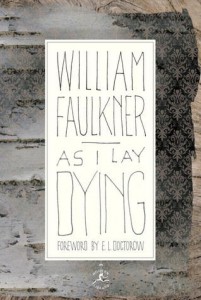
Darl
In a section narrated by Darl, Faulkner writes, “I could lie with my shirt-tail up…feeling myself without touching myself.” This is a quiet passage, one that I overlooked on the first couple of readings, but it sexualizes Darl. Because this passage follows shortly after Cora observing Eula’s attraction to Darl, an entire relationship blossomed in my mind.
Cora
I loved the way Cora’s commentary changed my understanding of characters I had already formed opinions about. For example, Darl spoke of Jewel as though he was protective of Addie and upset over the noise Cash was making in building her coffin. To Darl he was “a little boy in the dark.” Cora takes a much harsher view of Jewel, saying that he wouldn’t “miss a chance to make that extra three dollars at the price of his mother’s goodbye kiss.” Because of the choral way Faulkner constructed this novel, it is easy to have the reader’s understanding of the characters grow as each new character beholds them. This observation also speaks to the nature of the observer. Although Cora was not able to lash out in anger at the woman who reneged on her promise to buy cakes, Cora does have ill feelings toward Jewel. She is not as saintly as she might have us believe. In the first person narration of my novel, it is more difficult to get a myriad of views on a particular character. However, I can better use my dialogue to this effect.
Cora’s character is further developed as she rants against transporting Addie’s body to bury her, “She lived, a lonely woman, lonely with her pride, trying to make folks believe different, hiding the fact that they just suffered her, because she was not cold in the coffin before they were carting her forty miles away to bury her, flouting the will of God to do it. Refusing to let her lie in the same earth as those Bundrens.” It seems as though Cora is spiteful against Addie and against the Bundrens. Addie lies dying in the upstairs bedroom and in one sentence Cora talks about how the woman has isolated herself and that people didn’t want to be around her. In the same sentence she foreshadows that God’s vengeance will be wrought on this family (although the degree of flood, putrefaction, and other disasters isn’t even hinted at). And of course the language that Faulkner uses speaks to Cora’s background and upbringing (each of the characters has a slightly different manner of speech). In fact each of the characters has their own speech patterns—something else that escapes immediate notice—when read quickly the novel can come off as merely difficult rather than intricately crafted.
Reading Slowly
I am a modern girl: I write and think at a hundred miles an hour, but I also like to muse and rethink and ponder. This novel (and The English Patient) reminded me that good writing takes time and should be savored over time. I am certain that in spending more time with As I Lay Dying, I would see more and more layers in it and come to appreciate Faulkner’s craft all the more. As is, it serves as a good reminder for me to slow down in my own writing and take the time I need to in order to get the details and feel right. And if I want a reader to ponder slowly, I can craft my own gnarled sentences.
If this review made you want to read the book, support indie booksellers (and reviewers—I get a commission) by picking up a copy of As I Lay Dying from Bookshop.org.





Leave a Reply